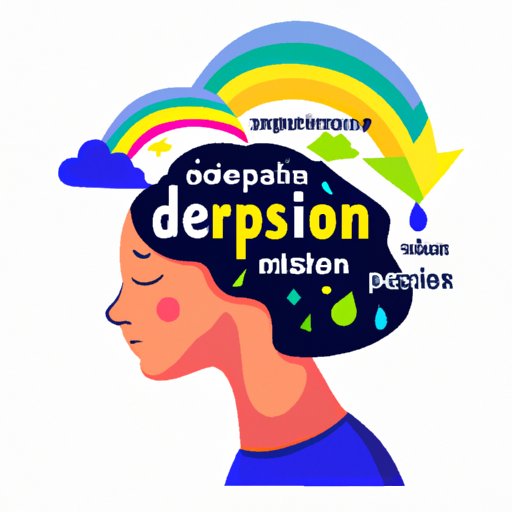Introduction
Depression is a common and serious mental health disorder that affects millions of people worldwide. According to the World Health Organization (WHO), approximately 264 million people experience depression, making it one of the leading causes of disability globally. Depression can range from mild to severe and can have a significant impact on a person’s daily life.
There are different types of depression, including major depressive disorder, persistent depressive disorder, and seasonal affective disorder. Symptoms of depression can vary depending on the severity and type of depression. Common signs and symptoms include feelings of sadness, loss of interest in activities previously enjoyed, changes in appetite and sleep patterns, and difficulty concentrating or making decisions.
Recognizing the Symptoms
Recognizing the symptoms of depression in someone can be challenging as people have different ways of coping with their feelings. However, some common signs and symptoms can indicate depression, such as:
- Feelings of sadness, hopelessness, or helplessness
- Loss of interest in activities and hobbies
- Changes in appetite and weight
- Problems sleeping or sleeping too much
- Loss of energy and fatigue
- Irritability or restlessness
- Difficulty concentrating, making decisions, or remembering things
- Physical symptoms like headaches, aches, or digestive problems
- Thoughts of self-harm or suicide
Depression symptoms can manifest differently in different people. It is essential to consider how your loved one typically behaves and what is unusual for them to identify signs of depression.
Supporting Someone with Depression
Support from friends and family is vital in managing depression. Here are some ways you can provide support:
- Show your support: Acknowledge your loved one’s feelings and offer support by listening without judgement. Let them know that you are there for them and that you care.
- Be patient: Depression can cause irritability and fatigue, so be patient with your loved one. Encourage them but avoid pressuring them to do things they are not ready for.
- Encourage self-care: Encourage your loved one to prioritize self-care by engaging in activities they enjoy and maintaining a healthy routine.
- Offer practical help: Offer to assist with everyday tasks or accompany them to appointments if necessary.
- Help them connect: Encourage your loved one to connect with others, whether through professional counseling, support groups, or healthy relationships.
Communication is key when supporting someone with depression. Here are some tips for communicating with someone with depression:
- Listen actively: Listen without judgment and avoid interrupting your loved one.
- Avoid accusatory statements: Use “I” statements and avoid blaming or shaming language.
- Be positive: Focus on the positive aspects of situations and avoid making negative or judgmental comments.
- Don’t minimize their feelings: Although you may not know what your loved one is experiencing, it is essential to acknowledge their feelings and provide support.
- Encourage treatment: Encourage your loved one to seek professional help and provide resources if necessary.
Remember that depression is a medical condition and requires professional treatment. While you can be a source of support, it is essential to encourage your loved one to seek treatment when necessary.
Treatment Options for Depression
Treatment options for depression include medication, psychotherapy, and in some cases, a combination of both. Here are some common types of treatments:
- Medication: Antidepressants can help manage symptoms of depression by regulating brain chemistry. However, they can take up to four to six weeks to begin working, and it is essential to work with a healthcare professional to manage medication use.
- Psychotherapy: Different types of psychotherapy, including cognitive-behavioral therapy (CBT) and interpersonal therapy (IPT), have been shown to be effective in treating depression. These therapies can help identify problematic thoughts and behaviors, improve coping skills, and improve communication with others.
- Brain stimulation therapy: Treatment options like electroconvulsive therapy (ECT) and repetitive transcranial magnetic stimulation (rTMS) can help alleviate symptoms in people who do not respond to medication and psychotherapy.
It is essential to seek professional help when experiencing persistent or severe symptoms of depression. While treatment can have some side effects, the benefits of managing depression outweigh the side effects.
Self-care when Helping Someone with Depression
Helping someone with depression can take an emotional toll on caregivers. Here are some ways you can practice self-care:
- Take care of yourself: Self-care is essential for caregivers. Make sure you are taking care of your physical, emotional, and mental health.
- Set boundaries: Know your limits and practice setting boundaries to avoid feeling overwhelmed or resentful.
- Seek support: Whether through support groups, friends, or family, seek support to avoid feelings of isolation.
- Practice stress-reducing activities: Engage in activities that help you manage stress, such as practicing mindfulness, exercising, or engaging in a hobby.
- Remember the importance of your role: Remember that providing support for someone with depression can have a significant impact on their recovery.
While helping someone with depression can be challenging, it is important to remember the positive impact you can have on their overall well-being. Additionally, it is essential to prioritize your own self-care to avoid burnout or secondary trauma.
Conclusion
Helping someone with depression is an essential and meaningful role. However, it is important to remember the importance of professional treatment and self-care. Recognizing the symptoms and offering support can positively impact your loved one’s life. Remember that you are not alone in this journey, and seek support if necessary.
